American Basics—Shelf Three
|
American Basics—Shelf Three |
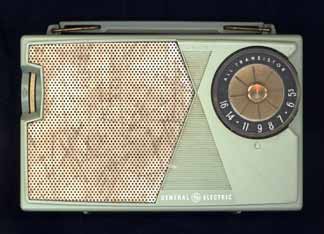
(GE 9-volt All Transistor
Radio)
[Northern Plains Archive Shelves—Circa 1958 or so]
Treasures from the American Attic
(The Song of the Blue Catfish)
"skip... 10. to send (a missile) ricocheting along a surface...14. a passing from one point or thing to another with disregard of what intervenes..." (Unabridged Random House Dictionary of the English Language, 1966)
"skip"...an electromagnetic phenomenon in which amplitude-modulated radio waves bounce between atmospheric layers (of a random and mysterious nature and occurrence) and the surface of the earth, follow landforms and rivers, and occasionally—apparently—disregard the limits of objective time, emanating from distant radio receivers at points far removed from the normal range of such broadcasts..." (Definition reached at the Northern Plains Archive Project, 1958-2003)
Another set of memories:
By the last half of the 1950s, the kids that hadn't already dropped out of country grammar schools were graduated in county-wide Eighth Grade Rural School Commencement ceremonies in musty county-seat auditoriums and courtrooms. They were faced with a choice. Eight grades were good enough for some of them, and that was the last graduation certificate they would receive. They went to work on ranches and farms and gas-delivery trucks, joining the family "business" or hiring out, and learning trades directly from the previous generation... Others went on to High School.
Families "in town" would board us rustics from Monday at supper through Friday morning. Friday evening through the start of classes at the High School on Monday would usually be spent back in the country. There wasn't a whole lot of money floating around. Some of us spent Monday evening delivering fresh eggs to our regular customers' houses, much to the disparagement of our contemporaries... Some of us got jobs as ushers at the local movie theatre (if the town was big enough) trying to work our way up to doorman... Some of us pumped gas after school, so we could trade out a place to work on the cars we had begun remanufacturing...
"Acculturation" was a word to come later. But just because we didn't know what to call it yet didn't change anything much. We called them "clicks." Later we found out how to spell it. Outsiders, we were. It wasn't necessarily a new role for a lot of us, but when you went home after school, it wasn't "home" any more. The wrong clothes. The wrong haircuts. The wrong footwear. And a brand new sheaf of unwritten rules that could be sensed but not discerned...and nobody would explain the code to you until you had already made the trip across the chasm between town and country. So you did what you could, learned to keep your mouth shut (especially in class), fought when you had to, and scraped together the money for shoes and a pair of pants made of anything-but-denim... and a belt you hadn't made yourself...with a small buckle.
But late on weeknights— upstairs in your room in an 1800's "railroad" house with the gas fittings still sticking through the ancient wallpaper that covered cavities in the lathe and plaster like the heads of a series of drums—we learned there was another whole world out there—somewhere. Because shoes were expensive, but you could pick up a cast-off "kitchen" radio (usually made out of dark brown bakelite for some reason) for a song. If you unscrewed the back and cobbled a connection between the antenna bundle in there and the gas pipes...just right...that whole sagging old house could be turned into a non-directional ear for the AM dial. And, if the atmospherics were just right, you could get the edges of signals from foreign countries like Arkansas and Tennessee.
AND THEN...
In those days, "Big Chief" tablets and spiral notebooks and cartridge pens and unchewed, still-tan crumbly erasers were always purchased at the Ben Franklin store in mid-August, before all of the money you'd made hiring out to the neighbors was spent at the J. C. Penney store or on orders from the Sears or Monkey Wards catalogues. And one year, sometime before the dawn of the Sixties, there appeared—in the front window of the Ben Franklin—an unbound stack of five-hole-punched notebook paper as tall as a colt's leg. Sitting on top of it was a bright, blue plastic "ALL TRANSISTOR RADIO", and a sign stating that the student correctly guessing the actual number of sheets in the stack would have this marvel awarded to them. You were limited to three guesses.
It was a big deal.
Our personal economies were built on a simple standard—there were the coins and bills that you were paid in and spent, and then there were Twenty-Dollar Bills, which were put away, if you got one, and never spent. Twenty-Dollar bills were "cased"... as "getaway money" or "hideout money." Anything bigger than that was mythology—as far as we knew anyway. And that blue plastic "ALL TRANSISTOR RADIO" was worth way more than a Twenty-Dollar Bill...because they had them for sale, in white, at the appliance store, and you could check. But that one in the window was the only blue one in town!
They put the stack of notebook paper right up against the window, reaching head-high on a kid.
Practical mathematics—born of desire and a country-school education—and an inspiration awoken-to at dawn on a late-summer day... A wooden, brass-edged ruler—carefully chosen from the many in a bin, based on the coincidence of the inch lines with the very edges of the wood—nonchalantly purchased with 500 sheets of the very same notebook paper (using change of course)... A furtive measurement of that huge stack from the window outside. And of exactly one inch of paper at home, with the same ruler, and a stack of books on top to squeeze the paper down. Three guesses...
One radio. Nine-volt, two-snap batteries purchased separately. And the discovery of directional antennas.
If you held the speaker right to your ear—well after dark and on certain nights—and turned your body as you moved the dial just a tiny bit, over and over, you could pick up the darnedest music you ever heard. Stuff that put rock and roll (a term that had caught on, notwithstanding some mysterious connotations) way, way in the shade.
Skip...
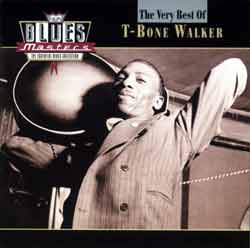
The Very Best of T-Bone Walker
(Blues Masters Series)
2000 Rhino Entertainment Company CD release
(Cover image is from the CD)
Compiled and Produced by James Austin and Billy Vera
Tracks recorded 1945-1957
You'll have to bear with us for a moment here...there's some hidden history here that's just too good to miss.
In 1890, a U.S. Navy officer named George Breed received a patent for an "apparatus for producing musical sounds by electricity." It involved modification of existing pianos and guitars, and use of a magnet, a conducting wheel turned by a clockwork motor and a battery. When a string was pressed against a fret, a note would be sounded. It didn't exactly catch on. But the idea of having guitar strings pass through a wrap-around magnet had been introduced.
In 1907, DeForest invented a vacuum tube (the triode) which could amplify weak signals enough to drive a loudspeaker, and the future of radios and phonographs was laid. And by the late 1920s, a few visionaries had seen the possibilities for amplification of guitars and were quietly hard at work.
The National Corporation had been established in California, in 1928, to produce the tri-cone resonator guitars designed by John Dopyera, and one of its founders was a man named George Beauchamp, who was also working on a design for an electro-magnetic pickup that wrapped around the guitar strings and whose signal could then be externally amplified and fed to a loudspeaker. After being strenuously invited to leave National, Beauchamp formed the Ro-Pat-In Corporation in 1931, together with Paul Barth and others including a pretty amazing engineer named Adolph Rickenbacker—whose name would subsequently be misspelled on the headstock of a number of Ro-Pat-In "Electro" brand guitars after 1934.
Ro-Pat-In introduced the first mass-produced electrical guitar. The prototype was made from a single piece of maple, hand carved by a former National employee named Harry Watson, and the production instrument was made from aluminum. It was a Hawaiian model that looked like a strange cross-breeding of a banjo, a chrome car-bumper and a non-ballistic shoulder-carried weapon for a street fight. It was quickly nicknamed the "frying pan." Later that same year (1932) Ro-Pat-In introduced an Electro wooden-body "Spanish" (body made by Harmony) electric that also used Beauchamp's horseshoe pickup. In 1934 the company name was changed to Electro String Instrument Corporation and the name "Richenbacher" (sic) was added to the headstock decals. In the latter-'30s some of the guitar bodies were made by Kay in Chicago and others. In 1937, George Beauchamp would receive a patent for the horseshoe-shaped magnetic pickup.
Meanwhile, in Kalamazoo, Michigan, (...you just knew we were going to get back to the middle of the continent with that Chicago reference, didn't you?...), the Gibson Guitar Company was busily making gorgeous, ever-larger acoustic guitars. A gentleman named Lloyd Loar came to work for them in 1919 and was responsible for the design of the legendary L-5 archtop acoustic introduced in 1922. By 1924, he had developed both an electric viola and bass, but Gibson wouldn't market them and he resigned. In 1933 he set up the Vivi-Tone Company and made guitars and mandolins. He used an internal pickup fed from the string bridge, and other innovative designs including a solid top and a recessed back with f-holes that was meant to be a secondary soundboard. He didn't sell a whole lot of these, but if you're going to explore the development of the instrument, you have to include the hidden Loar, right?
Back in Kalamazoo, 1934 brought the introduction of the 18-inch acoustic Gibson Super 400...a full inch wider than the 17-inch L-5s, L-7s and L-12s. It had been 10 years since Lloyd Loar's departure, but things were changing. In January, 1936, the company brought out its first electric, a Hawaiian model designated the EH-150. Later that same year, an archtop 16-inch hollowbody "Electric Spanish" ES-150 model was introduced. Walter Fuller had designed the pickup and hidden the bulky magnetic components inside the body, with only the coil cover, the polepiece and three screw visible from the front. If you want to see a picture of what we're talking about, search out a picture of Charlie Christian and his instrument when he joined the Bennie Goodman band in 1939. It's an ES-150.
And we're almost up to T-Bone Walker. In hugely simplified form, here's how it went.
Eddie Durham was more than likely the first major jazz figure to adopt the electric guitar. By the mid-1930s he was using it both on stage and when recording. Sometime after 1937, Charlie Christian met Durham and shortly thereafter acquired his first ES-150. When he was tapped by Bennie Goodman, he and his single-string soloing style (and the 150) became famous. When Gibson introduced the 17-inch ES-250 in 1939 Charlie not only adopted it...he endorsed it.
Christian had a friend (and sometime pupil) named T-Bone Walker, and the electric guitar made the jump from jazz to blues.
And we'll have a lot more to say about Mr. Walker shortly.
The songs:
1. Bobby Sox Blues
2. Mean Old World Blues
3. I'm Still in Love With You
4. Evenin'
5. Hypin' Women Blues
6. Call It Stormy Monday (But Tuesday is Just As Bad)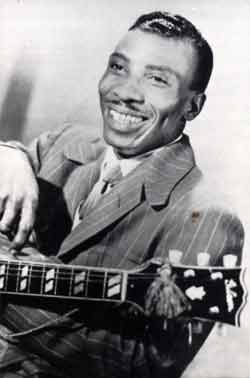
7. West Side Baby
8. Strollin' With Bones
9. The Hustle Is On
10. You Don't Understand
11. Tell Me What's the Reason
12. Papa Ain't Salty
13. Play On Little Girl
14. T-Bone Blues
15. How Long Blues
16. T-Bone Shuffle
(The image is from the CD insert)
We offer the 2000 Rhino Records issue of The Very Best of T-Bone Walker for $12.00 US, plus shipping and handling.
![]() (We
are currently refurbishing and expanding the record shelves and changing over to
a completely integrated payment system for our customers, but we will be happy
to honor orders received by e-mail during this interim. Click
button to send us your orders or comments.)
(We
are currently refurbishing and expanding the record shelves and changing over to
a completely integrated payment system for our customers, but we will be happy
to honor orders received by e-mail during this interim. Click
button to send us your orders or comments.)
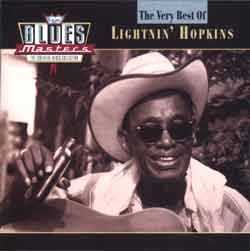 The
Very Best of Lightnin' Hopkins
The
Very Best of Lightnin' Hopkins
2000 Rhino Records release on CD
Produced by James Austin, John Brenes and Charlie Musselwhite
(Cover image is from the CD)
Tracks recorded 1947-1961
The songs:
1. Katie Mae Blues
2. Shotgun Blues
3. Baby Please Don't Go
4. Automobile
5. Give Me Central 209 (Hello Central)
6. Coffee Blues
7. I'm Beggin' You
8. Contrary Mary
9. Moanin' Blues
10. Penitentiary Blues
11. Fan It
12. Conversation Blues
13. Last Night Blues
14. Mighty Crazy
15. Mojo Hand
16. Baby Don't You Tear My Clothes
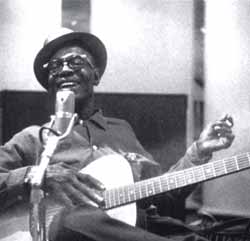 (The
image is from the CD insert)
(The
image is from the CD insert)
We offer the 2000 Rhino issue of The Very Best of Lightnin' Hopkins for $12.00 US, plus shipping and handling.
![]() (We
are currently refurbishing and expanding the record shelves and changing over to
a completely integrated payment system for our customers, but we will be happy
to honor orders received by e-mail during this interim. Click
button to send us your orders or comments.)
(We
are currently refurbishing and expanding the record shelves and changing over to
a completely integrated payment system for our customers, but we will be happy
to honor orders received by e-mail during this interim. Click
button to send us your orders or comments.)
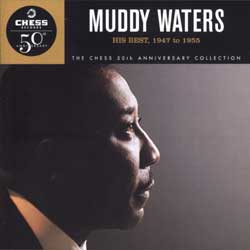 Muddy
Waters
Muddy
Waters
His Best (1947-1955)
1997 MCA/Chess release on CD
Roots and Blues Series Producer—Lawrence Cohn
(Cover image is from the CD)
The songs:
1. I Can't Be Satisfied
(April, 1948)
2. I Feel Like Going Home
(April, 1948)
3. Train Fare Blues (November,
1948)
4. Rollin' and Tumblin', Part 1
(February, 1950)
5. Rollin' Stone (February,
1950)
6. Louisiana Blues (October,
1950)
7. Long Distance Call
(January, 1951)
8. Honey Bee (January, 1951)
9. She Moves Me (July, 1951)
10. Still a Fool (July, 1951)
11. Standing Around Crying (September,
1952)
12. Baby Please Don't Go (May, 1953)
13. I Want You To Love Me (September,
1953)
14. I'm Your Hoochie Coochie Man (January,
1954)
15. I Just Want to Make Love To You
(April, 1954)
16. I'm Ready (September, 1954)
17. Young Fashioned Ways (February, 1955)
18. Mannish Boy (May, 1955)
19. Sugar Sweet (November, 1955)
20. Trouble No More (November, 1955)
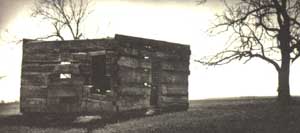 (The
image of his cabin on the Stovall Plantation is from the CD insert)
(The
image of his cabin on the Stovall Plantation is from the CD insert)
We offer the 1997 Chess/MCA issue of Muddy Waters: His Best (1947-1955) for $19.00 US, plus shipping and handling.
![]() (We
are currently refurbishing and expanding the record shelves and changing over to
a completely integrated payment system for our customers, but we will be happy
to honor orders received by e-mail during this interim. Click
button to send us your orders or comments.)
(We
are currently refurbishing and expanding the record shelves and changing over to
a completely integrated payment system for our customers, but we will be happy
to honor orders received by e-mail during this interim. Click
button to send us your orders or comments.)
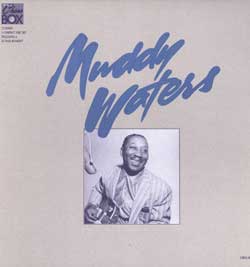 Muddy
Waters
Muddy
Waters
The Chess Box
1989 Chess/MCA release (3 CDs)
Produced by
(Image is from the cover of the boxed-set reissue)
Volume One (1947 to 1955)
The songs:
1. Gypsy Woman (1947)
2. Good Looking Woman
(1948) [Previously unreleased]
3. Mean Disposition (1948)
4. I Can't Be Satisfied (1948)
5. I Feel Like Going Home (1948)
6. Train Fare Home Blues (1948)
7. Mean Red Spider (1948)
[Previously unreleased on an album in the US]
8. Streamline Woman (1948)
9. Little Geneva (1949)
10. Rollin' and Tumblin', Part 1 (1950)
11. Rolling Stone (1950)
12. Walkin' Blues (1950)
13. Louisiana Blues (1950)
14. Evans Shuffle (1950)
15. Long Distance Call (1951)
16. Honey Bee (1951)
17. She Moves Me (1951)
18. Still a Fool (1951)
19. Stuff You Gotta Watch (1951)
20. Standing Around Crying (1952)
21. Flood (1952) [Previously
unreleased in the US]
22. Baby Please Don't Go (1953)
23. Blow Wind Blow (1953) [Previously
unreleased on an album in the US]
24. Hoochie Coochie Man (1954)
Volume 2 (1954 to 1959)
The songs:
1. I Just Want To Make Love To You (1954)
2. I'm Ready (1954)
3. Smokestack Lightnin' (1954)
4. Young Fashioned Ways (1955)
5. Mannish Boy (1955)
6. Trouble No More (1955)
7. Forty Days and Forty Nights (1956)
8. Just To Be With You (1956)
9. Don't Go No Farther (1956)
10. Diamonds At Your Feet (1956)
[Previously unreleased on an album in the US]
11. I Love the Life I Live, I Live the Life I Love (1956)
12. Rock Me (1956)
13. Look What You Done (1956) [Previously
unreleased on an album in the US]
14.
Got My Mojo Working (1956)
15. Good News (1957) [Previously
unreleased on an album in the US]
16. Evil (1957) [Previously unreleased on
an album in the US]
17. She's Nineteen Years Old (1958)
18. Close To You (1958)
19. Walkin' Thru the Park (1958)
20. Blues Before Sunrise (1959) [with
false starts, dialogue—previously unreleased in the US]
21. Lonesome Road Blues (1959)
22. Take the Bitter With the Sweet (1959)
[with dialogue, false start, alternate take—previously unreleased]
23. She's Into Something (1959)
24. Southbound Train (1959)
25. Double Trouble (1959)
Volume 3 (1960 to 1972)
The songs:
1. I Feel So Good (live) (1960)
2. You Shook Me (1962)
3. You Need Love (1962)
4. Twenty Four Hours (1957)
[Previously unreleased on an album in the US]
5. Elevate Me Mama (1963)
[Alternate take—Previously unreleased]
6. I'm So Glad I'm Living (1963)
[Previously unreleased in the US]
7. My Love Strikes Like Lightning (1963)
[Previously unreleased in the US]
8. You Don't Have To Go (1963)
[Alternate take—Previously unreleased]
9. Things I Used To Do (1963)
[Previously unreleased in the US]
10. My Home Is In the Delta (1963)
11. Good Morning Little Schoolgirl (1963)
12. The Same Thing (1964)
13. You Can't Lose What You Ain't Never Had (1964)
14. Short Dress Woman
(1964)
[Previously unreleased on an album in the US]
15. Making Friends (1966)
16. Black Night
(1966)
[Alternate take (no horns)—Previously unreleased]
17. Bird Nest On the Ground (1967)
18. Country Boy
(1968) [Live—Previously unreleased]
19. Sugar Sweet
(1969)
[Alternate take from "Fathers and Sons"—Previously unreleased]
20. All Aboard
(1969)
[Alternate take from "Fathers and Sons"—Previously unreleased]
21. Going Down Slow
(1971) [Live—Previously unreleased]
22. Who's Gonna Be Your Sweet Man When I'm Gone
(1971) [Original London mix (no horns)—Previously unreleased]
23. Can't Get No Grindin' (What's the Matter With the Meal) (1972)
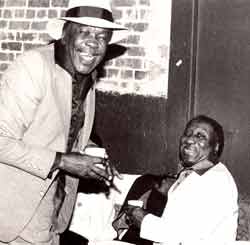 (The
image of Muddy and John Lee Hooker in 1980 is from the 30-page CD booklet)
(The
image of Muddy and John Lee Hooker in 1980 is from the 30-page CD booklet)
We offer the 1997 3-CD Chess/MCA issue of the Muddy Waters—The Chess Box for $50.00 US, plus shipping and handling.
![]() (We
are currently refurbishing and expanding the record shelves and changing over to
a completely integrated payment system for our customers, but we will be happy
to honor orders received by e-mail during this interim. Click
button to send us your orders or comments.)
(We
are currently refurbishing and expanding the record shelves and changing over to
a completely integrated payment system for our customers, but we will be happy
to honor orders received by e-mail during this interim. Click
button to send us your orders or comments.)
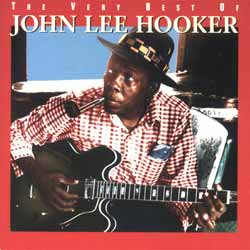 The
Very Best of John Lee Hooker
The
Very Best of John Lee Hooker
(1948-1967)
1995 Rhino Records release on CD
Compilation by James Austin
(Cover image is from the CD)
The songs:
1. Boogie Chillen'
2. Crawlin' King Snake
3. Hobo Blues
4. Huckle Up Baby
5. I'm In the Mood
6. I Need Some Money
7. Dimples
8. Boom Boom
9. Shake It Baby
10. Big Legs, Tight Skirt
11. It Serves You Right To Suffer
12. You Know, I Know
13. One Bourbon, One Scotch, One Beer
14. I'm Bad Like Jesse Jame
15. Burning Hell
16. Terraplane Blues (with Roy Rogers)
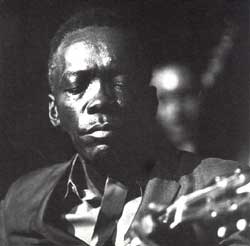 (The
image is from the insert to Chess CD below.)
(The
image is from the insert to Chess CD below.)
We offer the 1995 Rhino Records issue of The Very Best of John Lee Hooker for $12.00 US, plus shipping and handling.
![]() (We
are currently refurbishing and expanding the record shelves and changing over to
a completely integrated payment system for our customers, but we will be happy
to honor orders received by e-mail during this interim. Click
button to send us your orders or comments.)
(We
are currently refurbishing and expanding the record shelves and changing over to
a completely integrated payment system for our customers, but we will be happy
to honor orders received by e-mail during this interim. Click
button to send us your orders or comments.)
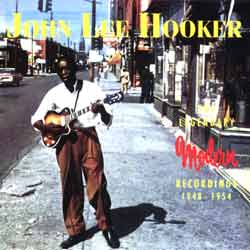 John
Lee Hooker
John
Lee Hooker
The Legendary Modern Recordings (1948-1954)
1993 Virgin Records release on CD
Compilation by Ray Topping
(Cover image is from the CD)
The songs:
1. Boogie Chillen
2. Sally Mae
3. Hoogie Boogie
4. Hobo Blues
5. Weeping Willow Boogie
6. Drifting From Door To Door
7. Crawling King Snake
8. Women In My Life
9. Howlin' Wolf
10. Playing the Races
11. Let Your Daddy Ride
12. Queen Bee
13. Wednesday Evening
14. I'm In the Mood
15. Tease Me Baby
16. Turn Over a New Leaf
17. Rock House Boogie
18. Too Much Boogie
19. Need Somebody
20. Gotta Boogie
21. Jump Me One More Time
22. Down Child
23. Bad Boy
24. Please Take Me Back
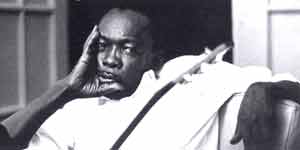 (The
image is from the insert to the Chess CD below.)
(The
image is from the insert to the Chess CD below.)
We will offer the 1993 Virgin Records issue of John Lee Hooker: The Legendary Modern Recordings when it returns to print or we can find other sourcing.
![]() (Click button to add to your cart
or wishlist. Not hot till then.)
(Click button to add to your cart
or wishlist. Not hot till then.)
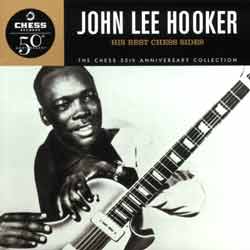 John
Lee Hooker
John
Lee Hooker
His Best Chess Sides (1950-1952)
1997 MCA Records release on CD
Compiled and Produced by Andy McKaie
(Cover image is from the CD)
The songs:
1. Mad Man Blues
2. Louise
3. Ground Hog Blues
4. High Priced Woman
5. Leave My Wife Alone
6. Sugar Mama
7. Walkin' the Boogie (alternate)
8. Bluebird
9. Please Don't Go
10. Blues for Big Town
11. Worried Life Blues
12. I'm In the Mood
13. Let's Go Out Tonight
14. The Waterfront
15. One Bourbon, One Scotch and One Beer
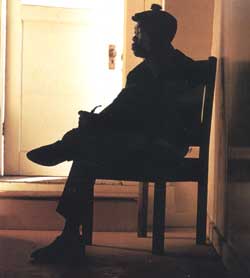 (The
image is from the insert to the Rhino CD above.)
(The
image is from the insert to the Rhino CD above.)
We offer the 1997 MCA Records issue of John Lee Hooker: His Best Chess Sides for $10.00 US, plus shipping and handling.
![]() (We
are currently refurbishing and expanding the record shelves and changing over to
a completely integrated payment system for our customers, but we will be happy
to honor orders received by e-mail during this interim. Click
button to send us your orders or comments.)
(We
are currently refurbishing and expanding the record shelves and changing over to
a completely integrated payment system for our customers, but we will be happy
to honor orders received by e-mail during this interim. Click
button to send us your orders or comments.)
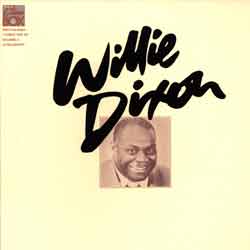 Willie
Dixon
Willie
Dixon
The Chess Box
1998 MCA Records release on CD
(No producer noted)
(Cover image is from the CD)
The songs:
1. Howlin' Wolf—Spoonful
2. Otis Rush—You
Know My Love
3. Bo Diddley—You
Can't Judge a Book By Its Cover
4. Howlin' Wolf—I
Ain't Superstitious
5. Muddy Waters—You
Need Love
6. Howlin' Wolf—Little
Red Rooster
7. Howlin' Wolf—Back
Door Man
8. Little Walter—Dead
Presidents
9. Howlin' Wolf—Hidden
Charms
10. Muddy Waters—You
Shook Me
11. Sonny Boy Williamson—Bring
It On Home
12. Howlin' Wolf—300
Pounds Of Joy
13. Willie Dixon—Weak
Brain, Narrow Mind
14. Koko Taylor—Wang
Dang Doodle
15. Muddy Waters—The
Same Thing
16. Howlin' Wolf—Built
For Comfort
17. Little Milton—I
Can't Quit You Baby
18. Koko Taylor—Insane
Asylum
The songs:
1. Little Walter—My
Babe
2. The Big Three—Violent
Love
3. Eddie Boyd—Third
Degree
4. Willie Mabon—Seventh
Son
5. Willie Dixon—Crazy
For My Baby
6. Willie Dixon—Pain
In My Heart
7. Muddy Waters—Hoochie
Coochie Man
8. Howlin' Wolf—Evil
9. Little Walter—Mellow
Down Easy
10. Jimmy Witherspoon—When
the Lights Go Out
11. Muddy Waters—Young
Fashioned Ways
12. Bo Diddley—Pretty
Thing
13. Muddy Waters—I'm
Ready
14. Lowell Fulson—Do
Me Right
15. Muddy Waters—I
Just Want To Make Love To You
16. Lowell Fulson—Tollin'
Bells
17. Willie Dixon—29
Ways
18. Willie Dixon—Walkin'
the Blues
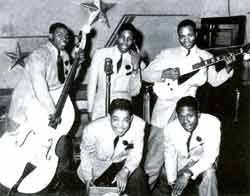 (The
1941 image of the Five Breezes is from the 10-page insert to the box set.)
(The
1941 image of the Five Breezes is from the 10-page insert to the box set.)
We offer the 1988 MCA issue of Willie Dixon: The Chess Box for $25.00 US, plus shipping and handling.
![]() (We
are currently refurbishing and expanding the record shelves and changing over to
a completely integrated payment system for our customers, but we will be happy
to honor orders received by e-mail during this interim. Click
button to send us your orders or comments.)
(We
are currently refurbishing and expanding the record shelves and changing over to
a completely integrated payment system for our customers, but we will be happy
to honor orders received by e-mail during this interim. Click
button to send us your orders or comments.)
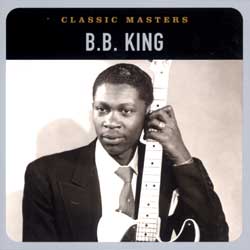 B.B.
King
B.B.
King
Classic Masters
2002 Virgin Records release on CD
Compiled and Produced by Cheryl Pawelski
24-bit Remastering
(Image of is from the CD cover)
The songs:
1. Three O'Clock Blues
2. You Know I Love You
3. Woke Up This Morning (My Baby She Was Gone)
4. Please Hurry Home
5. Please Love Me
6. You Upset Me Baby
7. Every Day I Have the Blues
8. Bad Luck
9. Sweet Little Angel
10. On My Word of Honor
11. Sweet Sixteen—Parts 1 and 2
12. Peace Of Mind
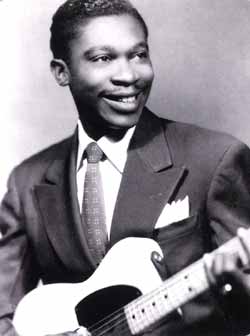 (The
photo is from the insert to the CD)
(The
photo is from the insert to the CD)
We offer the 2002 Virgin Records issue of B.B. King: Classic Masters for $12.00 US, plus shipping and handling.
![]() (We
are currently refurbishing and expanding the record shelves and changing over to
a completely integrated payment system for our customers, but we will be happy
to honor orders received by e-mail during this interim. Click
button to send us your orders or comments.)
(We
are currently refurbishing and expanding the record shelves and changing over to
a completely integrated payment system for our customers, but we will be happy
to honor orders received by e-mail during this interim. Click
button to send us your orders or comments.)
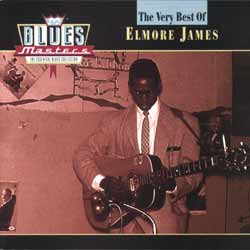 The
Very Best of Elmore James
The
Very Best of Elmore James
2000 Rhino Records release on CD
Compiled and Produced by James Austin and Robert Palmer
(Image is from the cover of the CD)
The songs:
1. Dust My Broom
2. Hawaiian Boogie
3. Please Find My Baby
4. Sho' Nuff I Do
5. Wild About You Baby
6. The 12 Year Old Boy
7. It Hurts Me Too
8. Cry For Me Baby
9. Coming Home
10. The Sky Is Crying
11. The Sun Is Shining
12. Madison Blues
13. I Can't Hold Out
14. Standing At the Crossroads
15. Done Somebody Wrong
16. Shake Your Moneymaker
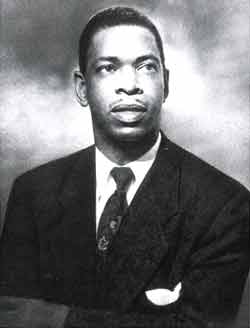 (The
image is from the CD insert.)
(The
image is from the CD insert.)
We offer the 2000 Rhino Records issue of The Very Best of Elmore James for $12.00 US, plus shipping and handling.
![]() (We
are currently refurbishing and expanding the record shelves and changing over to
a completely integrated payment system for our customers, but we will be happy
to honor orders received by e-mail during this interim. Click
button to send us your orders or comments.)
(We
are currently refurbishing and expanding the record shelves and changing over to
a completely integrated payment system for our customers, but we will be happy
to honor orders received by e-mail during this interim. Click
button to send us your orders or comments.)
![]()
Click here to continue with the postwar albums.